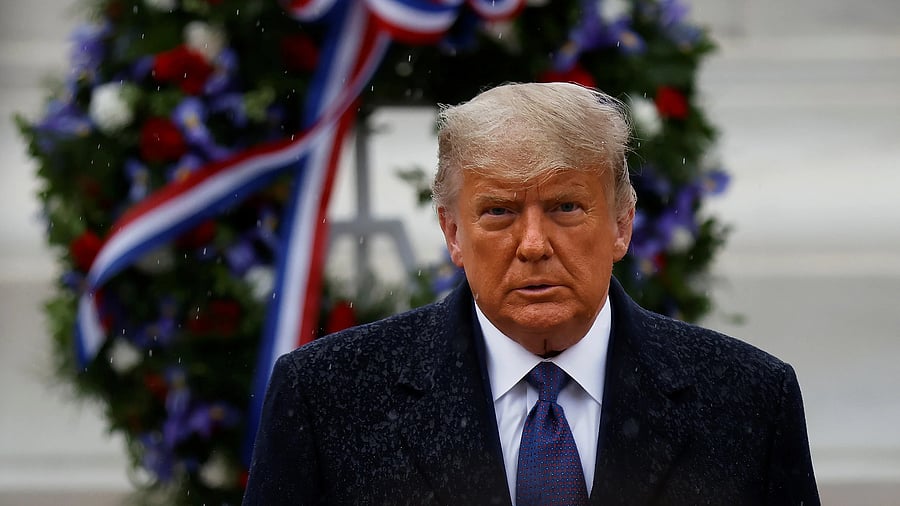
US President Donald Trump.
Credit: Reuters File Photo
There was something extraordinarily offbeat about the unveiling of two new futuristic Russian weapon systems by President Vladimir Putin last week on the eve of the Busan summit between United States President Donald Trump and his Chinese counterpart Xi Jinping.
The Kremlin spokesman Dmitry Peskov offered a laboured explanation that Putin was speaking at a military hospital where critically injured servicemen from the Ukraine battlefront were undergoing treatment, who would “naturally be interested in learning about the broader context of efforts to ensure our country’s security.”
Putin called the Burevestnik “a new, state-of-the-art, unlimited-range nuclear-powered missile” with a unique global reach and the Poseidon as the world’s first torpedo to be powered by a miniaturised nuclear reactor that would give it an effectively unlimited underwater range and also “surpasses all existing systems in speed and operational depth and currently has no equivalent and there will be none any time soon. There are also no interception methods.”
The Russian foreign ministry offered a different explanation that this “is a forced measure being taken to maintain strategic balance. In particular, our country is forced to respond to NATO's increasingly destabilising actions in the area of missile defence."
Coming after the Oreshnik intermediate-range ballistic missile with a speed exceeding Mach 10, which saw its first confirmed operational test last November in Ukraine, Russia is stealing a dramatic march over the United States in strategic weaponry. This has profound implications for global military balance for years, if not decades, to come. Russia already has more nuclear warheads than the US, while Nato no longer has the capacity to wage a continental war against Russia. Putin has promised that there are more wonder weapons being developed.
The terrible beauty about the Burevestnik and the Poseidon is that the Russians have only tested nuclear propulsion, but not weapons as such. It is an important distinction. Moscow is establishing ‘nuclear superiority’ by developing powerful dual-use delivery systems that are beyond the capacity of the US to intercept.
This is a shocking and awe-inspiring development that probably caught Trump by surprise. How far it prompted him to make conciliatory overtures to Putin in his interview with CBS News in the weekend we won’t know, but his remarks no longer had the boastful cutting edge that the oil sanctions would grievously wound Russia. Trump has gone back to the default position — the ‘Steve Witkoff line’ — that there could be a mutually beneficial economic partnership between the US and Russia, which he would very much welcome.
Trump also gave fulsome praise to Putin as a ‘tough’, ‘smart’, ‘strong’, and ‘serious’ leader who cannot be ‘toyed with’. He declared that the Tomahawk missile for Ukraine is not in his consideration zone, and, importantly, he pulled back to leave the Ukraine war to Moscow to slug it out with Kiev.
How far Putin’s stunning disclosure of Russia’s latest surge of military prowess influenced Trump’s conversation with Xi we won’t know when, after months of inflammatory rhetoric and a dizzying sequence of escalating tariffs against China, he sat down with the Chinese leader in Busan and signed the economic equivalent of a truce. Trump later described with characteristic ebullience that the 90-minute meeting was ‘amazing’ and a 12 ‘on a scale of one to 10.’
But China is not a country that rolls over and asks for mercy. Gerard Baker, the American political columnist, wrote in The Times that the Busan meeting “offered several clues to the likely course of geopolitics in the coming years… this cold war, the outcome of which will determine global security for the rest of the century, is surely not guaranteed to end the way the first one did… Security hawks worry that the time bought is mainly to China’s advantage, allowing Beijing to accelerate its economic development and challenge US dominance to emerging technologies and defence industries.”
The power play in Busan messaged that a significant change in the balance of power between the US and China is unmistakeable. Truly, Russia has played its part in this tactical détente between the US and China. Since further US-China tensions are inevitable, it matters to Beijing that much as the US is still without a peer on many fronts, having Russia on its side means they’re more than a match for Washington — apart from giving China much-needed strategic depth in a conflict situation.
China is digging in for a protracted struggle. In fact, US Treasury Secretary Scott Bessent already had some harsh words for China, post-Busan. He told the Financial Times that Beijing's gambit had backfired by exposing its willingness to weaponise critical minerals. Bessent claimed China's control over rare earth materials will be broken within the next two years (which is highly debatable), marking an aggressive timeline for the US to ramp up domestic production. Bessent added that Beijing would not be able to pull the same move again, saying "we have offsetting measures”.
As China remains at loggerheads with the US over geopolitical issues, one major issue (besides Taiwan) that tops the list is Beijing’s support for Russia in the Ukraine war. China simply cannot contemplate a Russian defeat at the hands of Nato. That alone makes Russia an irreplaceable partner for China in Eurasia.
The G2 gibberish is Trump’s dissimulation. In geopolitical terms, China understands perfectly well that Nato’s defeat in the Ukraine war works to its advantage, and, in turn, strengthens multipolarity in Eurasia as well as in the Indo-Pacific, where Russian and Chinese interests are already closely aligned.
(M K Bhadrakumar is a former diplomat.)
Disclaimer: The views expressed above are the author's own. They do not necessarily reflect the views of DH.